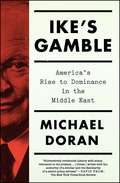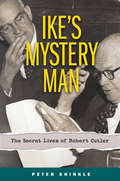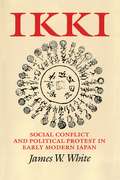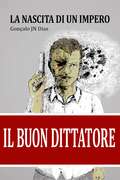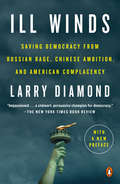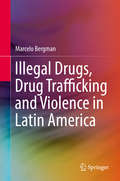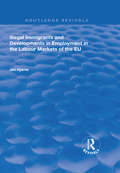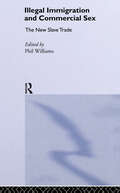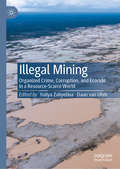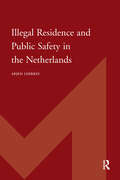- Table View
- List View
Ike
by Michael KordaIke is acclaimed author Michael Korda's sweeping and enthralling biography of Dwight David Eisenhower, arguably America's greatest general and one of her best presidents--a remarkable man in an extraordinary time, the hero who won the war and thereafter kept the peace.
Ike and Dick
by Jeffrey FrankDwight D. Eisenhower and Richard Nixon had a political and private relationship that lasted nearly twenty years, a tie that survived hurtful slights, tense misunderstandings, and the distance between them in age and temperament. Yet the two men brought out the best and worst in each other, and their association had important consequences for their respective presidencies. In Ike and Dick, Jeffrey Frank rediscovers these two compelling figures with the sensitivity of a novelist and the discipline of a historian. He offers a fresh view of the younger Nixon as a striving tactician, as well as the ever more perplexing person that he became. He portrays Eisenhower, the legendary soldier, as a cold, even vain man with a warm smile whose sound instincts about war and peace far outpaced his understanding of the changes occurring in his own country. Eisenhower and Nixon shared striking characteristics: high intelligence, cunning, and an aversion to confrontation, especially with each other. Ike and Dick, informed by dozens of interviews and deep archival research, traces the path of their relationship in a dangerous world of recurring crises as Nixon's ambitions grew and Eisenhower was struck by a series of debilitating illnesses. And, as the 1968 election cycle approached and the war in Vietnam roiled the country, it shows why Eisenhower, mortally ill and despite his doubts, supported Nixon's final attempt to win the White House, a change influenced by a family matter: his grandson David's courtship of Nixon's daughter Julie--teenagers in love who understood the political stakes of their union.
Ike and Dick: Portrait of a Strange Political Marriage
by Jeffrey FrankDwight D. Eisenhower and Richard Nixon had a political and private relationship that lasted nearly twenty years, a tie that survived hurtful slights, tense misunderstandings, and the distance between them in age and temperament. Yet the two men brought out the best and worst in each other, and their association had important consequences for their respective presidencies. In Ike and Dick, Jeffrey Frank rediscovers these two compelling figures with the sensitivity of a novelist and the discipline of a historian. He offers a fresh view of the younger Nixon as a striving tactician, as well as the ever more perplexing person that he became. He portrays Eisenhower, the legendary soldier, as a cold, even vain man with a warm smile whose sound instincts about war and peace far outpaced his understanding of the changes occurring in his own country. Eisenhower and Nixon shared striking characteristics: high intelligence, cunning, and an aversion to confrontation, especially with each other. Ike and Dick, informed by dozens of interviews and deep archival research, traces the path of their relationship in a dangerous world of recurring crises as Nixon's ambitions grew and Eisenhower was struck by a series of debilitating illnesses. And, as the 1968 election cycle approached and the war in Vietnam roiled the country, it shows why Eisenhower, mortally ill and despite his doubts, supported Nixon's final attempt to win the White House, a change influenced by a family matter: his grandson David's courtship of Nixon's daughter Julie--teenagers in love who understood the political stakes of their union.
Ike and McCarthy: Dwight Eisenhower's Secret Campaign against Joseph McCarthy
by David A. NicholsRevealed for the first time, this is the full story of how President Dwight Eisenhower masterminded the downfall of the anti-Communist demagogue Senator Joseph McCarthy.Behind the scenes, Eisenhower loathed McCarthy, the powerful Republican senator notorious for his anti-Communist witch hunt. In spite of a public perception that Eisenhower was unwilling to challenge McCarthy, Ike believed that directly confronting the senator would diminish the presidency. Therefore, the president operated with a “hidden hand,” refusing even to mention the Senator’s name. In Ike and McCarthy, David A Nichols shows how the tension between the two men escalated. In a direct challenge to Eisenhower, McCarthy alleged that the US Army was harboring communists and launched an investigation. But the senator had unwittingly signed his own political death warrant. The White House employed surrogates to conduct a clandestine campaign against McCarthy and was not above using information about the private lives of McCarthy’s aides as ammunition. In January 1954 McCarthy was arguably the most powerful member of the Senate. By the end of that year, he had been censured by his colleagues for unbecoming conduct. Eisenhower’s covert operation had discredited the senator months earlier, exploiting the controversy that resulted from the televised Army-McCarthy hearings. McCarthy would never recover his lost prestige. Nichols uses documents previously unavailable or overlooked to authenticate the extraordinary story of Eisenhower’s anti-McCarthy campaign. Ike and McCarthy is an eye-opening, newsworthy, and fascinating read.
Ike in Love and War: How Dwight D. Eisenhower Sacrificed Himself to Keep the Peace
by Richard StrinerDwight D. Eisenhower is one of America&’s greatest and least appreciated presidents.Behind the demeanor that made Dwight D. &“Ike&” Eisenhower so popular was a cold-as-steel intelligence that kept his country prosperous and out of danger. Because his operating methods were so deeply hidden, it is only in the past few decades that historians have grasped the full extent of his achievements. Ike in Love and War shows the hidden sacrifices that made Eisenhower remarkable. It probes the mission that was driving him: the quest to reconcile his skill as a fighter with his mother&’s pacifism, which led him to become the greatest peacekeeper of his age. More than other biographies, this one explores the man&’s emotions. It puts the long-standing dispute about his romance with Kay Summersby in a new perspective: tragedy. Here is the story of a unique American, the passion and brilliance he kept concealed, the ambition that propelled him, the sacrifices that wore down his health, and the sheer self-mastery that made it all look easy. It never was. His achievements are timely as Americans face unprecedented dangers. This is the story of the world Ike made, the things he achieved, and the surprises that may still be in store for us as we strive to understand his life in full.
Ike the Soldier
by Merle MillerFrom the bestselling author of Plain Speaking and Lyndon comes this &“vivid and consistently absorbing record of Dwight D. Eisenhower&’s military career&” (Kirkus Reviews). Bringing together thousands of hours of interviews with the men and women who were closest to him, Merle Miller has constructed a revealing and personal biography of the man who would become the supreme commander. From his childhood in Kansas to West Point, World War I, and Europe where he led the Allied Forces to a hard-won victory in World War II, Ike the Soldier goes behind the historic battles and into the heart and mind of Ike Eisenhower. Miller has crafted the defining biography on the life of the thirty-fourth president, bringing more depth to the man many thought they knew. His strained relationships with his father, brothers, and son are brought into focus; as well as his love affair with his wife Mamie, and his relationship with Kay Summersby—his driver turned companion and confidante during WWII. &“An informed and balanced tribute to a world-class leader whose remarkable character gains greater luster with the passage of time.&” —Kirkus Reviews &“This is a highly enjoyable look at Ike&’s personal and official relationships with the people most important to him during the first 55 years of his life, including family, Army and Allied colleagues and heads of state.&” —Publishers Weekly
Ike's Bluff: President Eisenhower's Secret Battle to Save the World
by Evan ThomasUpon assuming the presidency in 1953, Dwight Eisenhower came to be seen by many as a doddering lightweight. Yet behind the bland smile and apparent simplemindedness was a brilliant, intellectual tactician. As Evan Thomas reveals in his provocative examination of Ike's White House years, Eisenhower was a master of calculated duplicity. As with his bridge and poker games he was eventually forced to stop playing after leaving too many fellow army officers insolvent, Ike could be patient and ruthless in the con, and generous and expedient in his partnerships. Facing the Soviet Union, China, and his own generals, some of whom believed a first strike was the only means of survival, Eisenhower would make his boldest and riskiest bet yet, one of such enormity that there could be but two outcomes: the survival of the world, or its end.This is the story of how he won.
Ike's Gamble: America's Rise to Dominance in the Middle East
by Michael DoranThis major retelling of the Suez Crisis of 1956--one of the most important events in the history of US policy in the Middle East--shows how President Eisenhower came to realize that Israel, not Egypt, is America's strongest regional ally.In 1956 President Nasser of Egypt moved to take possession of the Suez Canal, thereby bringing the Middle East to the brink of war. The British and the French, who operated the canal, joined with Israel in a plan to retake it by force. Despite the special relationship between England and America, Dwight Eisenhower intervened to stop the invasion. In Ike's Gamble, Michael Doran shows how Nasser played the US, invoking America's opposition to European colonialism to drive a wedge between Eisenhower and two British Prime Ministers, Winston Churchill and Anthony Eden. Meanwhile, in his quest to make himself the strongman of the Arab world, Nasser was making weapons deals with the USSR and destabilizing other Arab countries that the US had been courting. The Suez Crisis was his crowning triumph. In time, Eisenhower would conclude that Nasser had duped him, that the Arab countries were too fractious to anchor America's interests in the Middle East, and that the US should turn instead to Israel. Affording deep insight into Eisenhower and his foreign policy, this fascinating and provocative history provides a rich new understanding of how the US became the power broker in the Middle East.
Ike's Mystery Man: The Secret Lives of Robert Cutler
by Peter ShinkleThe Cold War, The Lavender Scare and the Untold Story of Eisenhower's First National Security Advisor."An extraordinary story. . . a gripping, moving tale." -- Evan Thomas, author of Ike's Bluff: President Eisenhower's Secret Battle to Save the World"A historical treasure unearthed . . . A must-read for all Cold War scholars, it is a great read for everyone else." -- Martin J. Sherwin, Pulitzer-Prize-winning co-author of American Prometheus: The Triumph and Tragedy of J. Robert Oppenheimer"This is a book that deserves, and is sure to get, a wide audience." -- Michael Isikoff, co-author of Russian Roulette: The Inside Story of Putin's War on America and the Election of Donald TrumpPresident Eisenhower's National Security Advisor Robert "Bobby" Cutler shaped US Cold War strategy in far more consequential ways than previously understood. A lifelong Republican, Cutler also served three Denocratic presidents. The life of any party, he was a tight-lipped loyalist who worked behind the scenes to get things done. While Cutler's contributions to the public sphere may not have received, until now, the consideration they deserve, the story of his private life has never before been told.Cutler struggled throughout his years in the White House to discover and embrace his own sexual identity and orientation, and he was in love with a man half his age, NSC staffer Skip Koons. Cutler poured his emotions into a six-volume diary and dozens of letters that have been hidden from history. Steve Benedict, who was White House security officer, Cutlers' friend and Koons' friend and former lover, preserved Cutler's papers. All three men served Eisenhower at a time when anyone suspected of "sexual perversion", i.e. homosexuality, was banned from federal employment and vulnerable to security sweeps by the FBI.
Ike's Mystery Man: The Secret Lives of Robert Cutler (Documentary Narratives)
by Peter ShinkleThe Cold War, The Lavender Scare, and the Untold Story of Eisenhower's First National Security Advisor. President Eisenhower's National Security Advisor Robert "Bobby" Cutler -- working alongside Ike and also the Dulles brothers at the CIA and State Department -- shaped US Cold War strategy in far more consequential ways than previously understood. A lifelong Republican, Cutler also served three Democratic presidents. A charming raconteur, he was a tight-lipped loyalist who worked behind the scenes to get things done.Cutler was in love with a man half his age, naval intelligence officer and NSC staffer Skip Koons. Cutler poured his emotions into a six-volume diary and dozens of letters that have been hidden from history. Steve Benedict, who was White House security officer, Cutlers' friend and Koons' friend and former lover, preserved Cutler's papers. All three men served Eisenhower at a time when anyone suspected of "sexual perversion", i.e. homosexuality, was banned from federal employment and vulnerable to security sweeps by the FBI. This gripping account reveals in fascinating detail Cutler's intimate thoughts and feelings about US efforts to confront Soviet expansion and aggression while having to contend with the reality that tens of millions of people would die in a first nuclear strike, and that a full nuclear exchange would likely lead to human extinction. And Shinkle recounts with sensitivity the daily challenges and personal dramas of a small but representative group or patriotic gay men who were forced to hide essential aspects of who they were in order to serve a president they admired and a country they loved.
Ike: An American Hero
by Michael KordaIke is acclaimed author Michael Korda's sweeping and enthralling biography of Dwight David Eisenhower, arguably America's greatest general and one of her best presidents--a remarkable man in an extraordinary time, the hero who won the war and thereafter kept the peace.
Ikisvin Shatabadi Main Lok Prashasan
by Ashoke Kumar DubeThis is a very good effort by the writer to let the reader understand the continuous change in the administrative arena. Public administration is government in its functioning. The writer has made very good attampt to tell the reader about the public administration in consonance with the cyber age.
Ikki: Social Conflict and Political Protest in Early Modern Japan
by James W. WhiteThe reign of the Tokugawa shoguns was a time of statebuilding and cultural transformation, but it was also a period of ikki: peasant rebellion. James W. White reconstructs the pattern of social conflict in early modern Japan, both among common people and between the populace and the government. Ikki is the first book to cover popular protest in all regions of Japan and to encompass nearly three centuries of history, from the beginnings of the Tokugawa shogunate in the 1590s to the Meiji restoration. White applies contemporary sociological theory to evidence previously unavailable in English. He draws on the long historical record of peasant uprisings, using narrative interpretation and sophisticated quantitative analysis. By linking the texture of conflict to the political and economic regime the shoguns created, he casts doubt on competing interpretations of a contained, orderly society.
Il Buon Dittatore - La Nascita di un Impero: La Nascita di un Impero
by Gonçalo J. Nunes Dias Maria Francesca Rinaldi MoraisUn oggetto non identificato è atterrato sulla luna e nessuno sembra conoscerne l’origine. Gustavo, un informatico di mezza età, con una vita comoda e grigia, decide di stilare una lista, insieme a due amici, per cercare di sopravvivere in caso di un ipotetico attacco. Si lascia ossessionare dalla lista, spende una fortuna, rapina una farmacia e viene considerato pazzo dalla famiglia, ma dopo l’attacco il pazzo sarà colui che meglio si è adattato alla nuova era della società.
Il Paladino
by Kenneth EadeDall'autore più venduto e premiato, i critici lo considerano come "uno degli scrittori di thriller più bravi sul nostro panorama". Robert Garcia era un uomo insignificante, sfruttato con la scusa di una promettente carriera militare per diventare un assassino della squadra della morte per la CIA. Il pensionamento non era previsto per Robert, quindi scomparve. Dopo essere uscito dal freddo per rispondere alla chiamata in aiuto di un commilitone, Robert viene riportato sotto i riflettori quando si trova nel posto sbagliato al momento sbagliato e uccide un terrorista, salvando così dozzine di vite. Trova un impiego remunerativo nel massacro di jihadisti, il che scatena una leggenda metropolitana secondo cui Robert, un assassino pericoloso e insensibile, è un paladino vivente, la cui missione è liberare la terra dal male per il miglioramento dell'umanità. A questo punto gli viene dato il nome: "Paladino".
Il Segreto di Trump: memorie di uno schiavo del sesso
by Orwell Danes Urania DessiUn racconto divertente sulla vita privata di Donald Trump Donald Trump ha un segreto. È un segreto così grande che l’autore di queste memorie ha chiesto addiritura di rimanere anonimo. Ma la verità alla fine viene a galla! Questa è la storia tragica di un uomo e del potere enorme che detiene. Raccontata dal punto di vista di “Johnny”, ci fa scoprire come ci si sente a essere alla mercé di un uomo con risorse infinite a sua disposizione. Non guarderete mai più Donald Trump nello stesso modo.
Il mio viaggio attraverso l'occidente (Autobiografia)
by Wael El-Manzalawy Mattia BarattoEro molto interessato alla politica ed alle notizie. Ed il risultato fu che sentivo che tutte le persone occidentali ci odiavano. Dato che generalizzare è un errore molto comune, ne fui vittima: ascoltavo le notizie e generalizzavo il mio sentire che tutti gli occidentali ci odiassero e volessero distruggere i nostri paesi. Fin dal 2003, ho cominciato ad usare Internet. Ho avuto a che fare con tante persone occidentali. E gradualmente i miei sentimenti sono cambiati. Vi invito a leggere questo libro e scoprire il mio viaggio attraverso il mondo occidentale.
Ill Winds: Saving Democracy from Russian Rage, Chinese Ambition, and American Complacency
by Larry DiamondFrom America’s leading scholar of democracy,a personal, passionate call to action against the rising authoritarianism that challenges our world order—and the very value of libertyLarry Diamond has made it his life's work to secure democracy's future by understanding its past and by advising dissidents fighting autocracy around the world. Deeply attuned to the cycles of democratic expansion and decay that determine the fates of nations, he watched with mounting unease as illiberal rulers rose in Hungary, Poland, Turkey, the Philippines, and beyond, while China and Russia grew increasingly bold and bullying. Then, with Trump's election at home, the global retreat from freedom spread from democracy's margins to its heart. Ill Winds' core argument is stark: the defense and advancement of democratic ideals relies on U.S. global leadership. If we do not reclaim our traditional place as the keystone of democracy, today's authoritarian swell could become a tsunami, providing an opening for Vladimir Putin, Xi Jinping, and their admirers to turn the twenty-first century into a dark time of despotism.We are at a hinge in history, between a new era of tyranny and an age of democratic renewal. Free governments can defend their values; free citizens can exercise their rights. We can make the internet safe for liberal democracy, exploit the soft, kleptocratic underbelly of dictatorships, and revive America's degraded democracy. Ill Winds offers concrete, deeply informed suggestions to fight polarization, reduce the influence of money in politics, and make every vote count. In 2019, freedom's last line of defense still remains "We the people."
Illegal Drugs, Drug Trafficking and Violence in Latin America
by Marcelo BergmanThis book describes the main patterns and trends of drug trafficking in Latin America and analyzes its political, economic and social effects on several countries over the last twenty years. Its aim is to provide readers an introductory yet elaborate text on the illegal drug problem in the region. It first seeks to define and measure the problem, and then discusses some of the implications that the growth of production, trafficking, and consumption of illegal drugs had in the economies, in the social fabrics, and in the domestic and international policies of Latin American countries. This book analyzes the illegal drugs problem from a Latin American perspective. Although there is a large literature and research on drug use and trade in the USA, Canada, Europe and the Far East, little is understood on the impact of narcotics in countries that have supplied a large share of the drugs used worldwide. This work explores how routes into Europe and the USA are developed, why the so-called drug cartels exist in the region, what level of profits illegal drugs generate, how such gains are distributed among producers, traffickers, and dealers and how much they make, why violence spread in certain places but not in others, and which alternative policies were taken to address the growing challenges posed by illegal drugs. With a strong empirical foundation based on the best available data, Illegal Drugs, Drug Trafficking and Violence in Latin America explains how rackets in the region built highly profitable enterprises transshipping and smuggling drugs northbound and why the large circulation of drugs also produced the emergence of vibrant domestic markets, which doubled the number of drug users in the region the last 10 years. It presents the best available information for 18 countries, and the final two chapters analyze in depth two rather different case studies: Mexico and Argentina.
Illegal Immigrants and Developments in Employment in the Labour Markets of the EU
by Jan HjarnøThis title was first published in 2003. The problem of illegal labour immigration is one of the most controversial and hotly debated issues to confront the EU. This book examines the Scandinavian model of social partnership by which labour market relations are governed, creating an effective barrier to the employment of illegal immigrants. Using Denmark, Portugal and Germany as case studies it questions the impact of illegal immigrants and whether they pose a serious threat to the free movement of labour, capital and commodities. It will prove invaluable to those interested in labour market relations throughout the world.
Illegal Immigration and Commercial Sex: The New Slave Trade
by Phil WilliamsExamining the dynamics of the sex trade in both Europe and Asia, this study identifies the role of organized crime and considers the counter measures which governments and law enforcement agencies must take to combat this global problem.
Illegal Mining: Organized Crime, Corruption, and Ecocide in a Resource-Scarce World
by Daan Van Uhm Yuliya ZabyelinaThis book provides a comprehensive analysis of the illegal extraction of metals and minerals from the perspectives of organized crime theory, green criminology, anti-corruption studies, and victimology. It includes contributions that focus on organized crime-related offences, such as drug trafficking and trafficking in persons, extortion, corruption and money laundering and sheds light on the serious environmental harms caused by illegal mining. Based on a wide range of case studies from the Amazon rainforest through the Ukrainian flatlands to the desert-like savanna of Central African Republic and Australia’s elevated plateaus, this book offers a unique insight into the illegal mining business and the complex relationship between organized crime, corruption, and ecocide. This is the first book-length publication on illegal extraction, trafficking in mined commodities, and ecocide associated with mining. It will appeal to scholars working on organized crime and green crime, including criminologists, sociologists, anthropologists, and legal scholars. Practitioners and the general public may welcome this comprehensive and timely publication to contemplate on resource-scarcity, security, and crime in a rapidly changing world.
Illegal Peace in Africa: An Inquiry into the Legality of Power Sharing with Warlords, Rebels, and Junta
by Jeremy I. LevittAfrican states have become testing grounds for Western conflict-resolution experiments, particularly power-sharing agreements, supposedly intended to end deadly conflict, secure peace, and build democracy in divided societies. This volume examines the legal and political efficacy of transitional political power-sharing between democratically constituted governments and the African warlords, rebels, or junta that seek to violently unseat them. What role does law indicate for itself to play in informing, shaping, and regulating peace agreements? This book addresses this question and others through the prism of three West African case studies: Liberia, Sierra Leone, and Guinea-Bissau. It applies the Neo-Kadeshean Model of analysis and offers a framework for a 'Law on Power-sharing. ' In a field dominated by political scientists, and drawing from ancient and contemporary international law, this book represents the first substantive legal critique of the law, practice, and politics of power sharing.
Illegal People: How Globalization Creates Migration and Criminalizes Immigrants
by David BaconFor two decades veteran photojournalist David Bacon has documented the connections between labor, migration, and the global economy. In Illegal People Bacon explores the human side of globalization, exposing the many ways it uproots people in Latin America and Asia, driving them to migrate. At the same time, U. S. immigration policy makes the labor of those displaced people a crime in the United States. Illegal People explains why our national policy produces even more displacement, more migration, more immigration raids, and a more divided, polarized society. Through interviews and on-the-spot reporting from both impoverished communities abroad and American immigrant workplaces and neighborhoods, Bacon shows how the United States' trade and economic policy abroad, in seeking to create a favorable investment climate for large corporations, creates conditions to displace communities and set migration into motion. Trade policy and immigration are intimately linked, Bacon argues, and are, in fact, elements of a single economic system. In particular, he analyzes NAFTA's corporate tilt as a cause of displacement and migration from Mexico and shows how criminalizing immigrant labor benefits employers. For example, Bacon explains that, pre-NAFTA, Oaxacan corn farmers received subsidies for their crops. State-owned CONASUPO markets turned the corn into tortillas and sold them, along with milk and other basic foodstuffs, at low, subsidized prices in cities. Post-NAFTA, several things happened: the Mexican government was forced to end its subsidies for corn, which meant that farmers couldn't afford to produce it; the CONASUPO system was dissolved; and cheap U. S. corn flooded the Mexican market, driving the price of corn sharply down. Because Oaxacan farming families can't sell enough corn to buy food and supplies, many thousands migrate every year, making the perilous journey over the border into the United States only to be labeled "illegal" and to find that working itself has become, for them, a crime. Bacon powerfully traces the development of illegal status back to slavery and shows the human cost of treating the indispensable labor of millions of migrants-and the migrants themselves-as illegal. Illegal People argues for a sea change in the way we think, debate, and legislate around issues of migration and globalization, making a compelling case for why we need to consider immigration and migration from a globalized human rights perspective.
Illegal Residence and Public Safety in the Netherlands (IMISCOE Dissertations)
by Arjen LeerkesMaking illegal residence unattractive is a way for Western governments to limit migration from non-Western countries. Focusing on Dutch neighbourhoods with substantial levels of unauthorised migrants, Illegal Residence and Public Safety in the Netherlands examines how restrictive immigration policy influences immigrant crime and perceived neighborhood security. Salient questions arise. To what extent, and under which conditions, do illegal residence and illegal migration impact public safety? Does having illegal residence status influence how people observe or break the law and other social rules? Do their ties with established groups, such as legal migrants, employers and partners, have any sway? Answers to these issues begin surfacing in this rich combination of quantitative information, comprising police figures and surveys on victimisation, and qualitative sources, including interviews at the Dutch Aliens Custody and urban field research.






